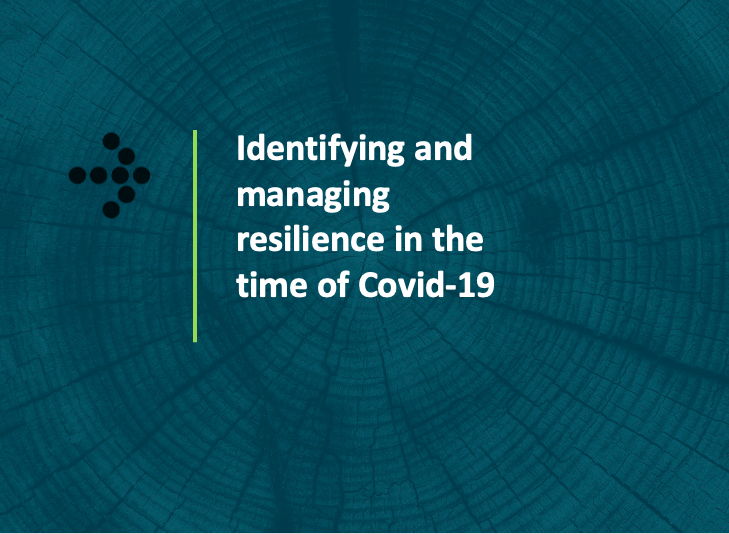Identifying and managing resilience in the time of Covid-19

The Covid-19 pandemic has put the need for organisations to understand, identify and strengthen the resilience of their organisations and employees at the forefront of business strategies.
Resilience is a quality displayed by individuals who are able to remain calm during a crisis and move on from disruptive events or situations without experiencing negative long-term consequences.
Resilient individuals are more likely to have developed psychological and behavioural capabilities that allow them to deal with disappointment, failure and rejection, and readily make adjustments to accommodate new circumstances.
Broadly speaking there are three ways people tend to respond to a negative event. The first is to explode with anger; the second is to collapse and go numb; the third is to become upset by the event, make adjustments if need be, and move on.
The latter response is exhibited by resilient individuals. They tend to reframe their outlook to maintain a sense of well-being and acceptance.
People who respond with anger or numbness adopt a victim mentality, blaming others for the situation they are in. These people often drop into a spiral of negative emotions (fear, anger, anxiety, distress, helplessness, hopelessness, etc.) that prevent them from being able to solve problems. This type of spiral can even weaken a person’s immune system and cause them to become physically ill. This can have a seriously negative impact on their work performance.
The following are some of the traits exhibited by resilient people:
- The ability to make realistic plans – and to follow through with them
- Confidence in their personal strengths and abilities
- Communication and problem-solving skills
- The ability to manage strong impulses and feelings
Deloitte recently released an insightful article about the traits displayed by resilient leaders during Covid-19, which tend to include:
- The need to design from the heart … and the head. Resilient leaders are genuinely, sincerely empathetic, walking compassionately in the shoes of employees, customers, and their broader ecosystems. Yet resilient leaders must simultaneously take a hard, rational line to protect financial performance from the invariable softness that accompanies such disruptions.
- Put the mission first. Resilient leaders are skilled at triage, able to stabilize their organizations to meet the crisis at hand while finding opportunities amid difficult constraints.
- Aim for speed over elegance. Resilient leaders take decisive action—with courage—based on imperfect information, knowing that expediency is essential.
- Own the narrative. Resilient leaders seize the narrative at the outset, being transparent about current realities—including what they don’t know—while also painting a compelling picture of the future that inspires others to persevere.
- Embrace the long view. Resilient leaders stay focused on the horizon, anticipating the new business models that are likely to emerge and sparking the innovations that will define tomorrow.
While there are a number of predictors for resilience (including a positive and proactive personality, experience and learning, sense of control, flexibility and adaptability, balance and perspective, and perceived social support), it is also possible for individuals to purposefully build resilience within themselves. The American Psychological Association suggests “10 Ways to Build Resilience”, which are highly relevant during this disruptive time:
- Maintaining good relationships with close family members, friends and others
- Not seeing crises or stressful events as unbearable problems
- Accepting circumstances that cannot be changed
- Developing realistic goals and moving towards them
- Taking decisive actions in adverse situations
- Seeking out opportunities of self-discovery after a struggle with loss
- Developing self-confidence
- Keeping a long-term perspective and considering the stressful event in a broader context
- Maintaining a hopeful outlook, expecting good things and visualizing what is wished
- Taking care of your mind and body, exercising regularly, paying attention to your own needs and feelings
Evalex is able to identify and suggest mitigating strategies for employees who may or may not be experiencing resilience, amongst a number of other ‘performance inhibitors’ through our online psychometrics. This approach can also be used to understand if an organisation is experiencing a serious lack of resilience across the workforce and how to proactively manage this.
A performance inhibitor is a characteristic behaviour or combination of traits that could impede an individual’s overall performance in the workplace. Inhibitors can potentially impact a person’s ability to resolve problems, manage relationships, manage themselves, and execute and deliver on their tasks and objectives.
For the past 40 years Evalex has been identifying areas of non-performance in companies and devising strategies to mitigate the impact of inhibitors such as a lack of resilience among individuals in the workplace. Using data collected from non-performance information, an analysis was done and we identified a set of 44 specific traits that can contribute towards underperformance or non-delivery. Based on this research, inhibitors are identified through the use of Artificial Intelligence in the Evalex system, which integrates psychometric constructs from across a variety of well researched tests (personality, interests, work styles, values and cognitive ability).
Evalex measures performance inhibitors and enhancers as part of our psychometric and leadership assessments, which also maps archetypes, styles, potential and leadership indicators, job fit and talent.
For more information on how we can assist you in identifying highly resilient leaders, or employees who may be struggling with their resilience, contact us on [email protected] or visit our website.